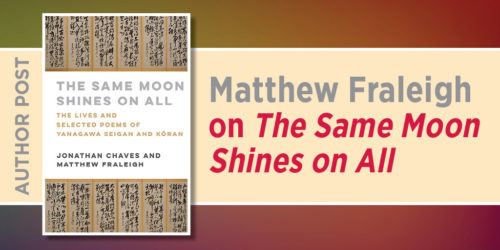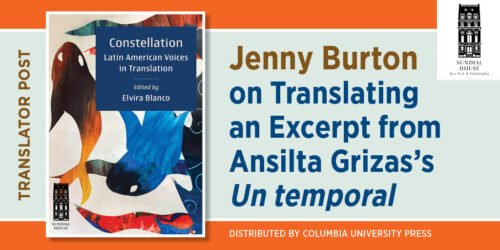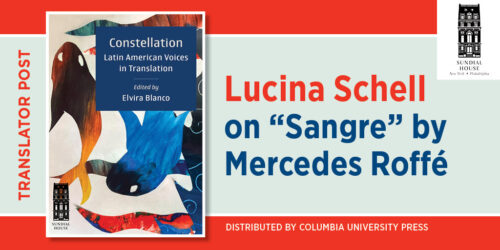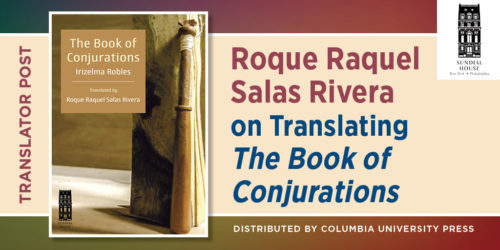André Colomer, the Action of the Arts, and the Importance of Poetry
Oskar De Wolf

– An individualist anarchist?
To the uninitiated, it may appear somewhat peculiar that an individualist anarchist is a part of poetry month at the Columbia University Press blog. Anarchism has a well-earned reputation for being a little cold, a little distant, nihilistic, and iconoclastic – all attitudes that don’t traditionally fare very well in poetry. Meanwhile, anarchist and individualist philosophers might have dabbled in the form a bit, yet their poetic exploits are generally not a part of their larger oeuvre and worldview.
However, this has not always been the case. In the early twentieth century, a young, heterogeneous, and radical movement arose in Europe to drastically challenge the relationship between revolutionary politics, the arts, and beauty itself. And André Colomer, a poet laden with intense sensitivity, would explode onto the scenes this movement offered to grow to be one of the foremost theoreticians of anarchist individualism of his era, never losing sight of his poetic roots.
In one sentence, the impetus of the Action d’Art, or the action of the arts movement – as Colomer would refer to it – can be aptly recapitulated in the worlds of Belgian Art Nouveau architect Henry Van De Velde: “We have chosen beauty to lift society toward better things. Beauty is not the olive branch, it’s the Gladius [sword]!”. Some of Colomer’s first writings of note appeared in a periodical journal that serves as a good example for this attitude. Fittingly entitled Les Actes des Poètes, or, the acts of poets, its cover featured a giant figure sitting atop Paris while playing a harp. The harp player looks like a Greek god – a symbol for idealized beauty but also physical strength. Through his size and position, dominating over the miniaturized city, his immense power over society is clear. Yet despite this (or maybe because of it), his face looks melancholic, and he sits alone. The arts are symbolized by the harp, a tender yet commanding force to change society.
– Lyrical individualism
If this characterization lacks concreteness to make it appealing, it serves to take a step back and look into Colomer’s own influences. The first name to mention here is Max Stirner, whose writings Colomer discovered early in life. Stirner’s main work, The Ego and Its Own (1844), was perhaps the most intellectually uprooting work of its era. Pushing ideas of free individualism to their ultimate logical conclusions, Stirner not only rejected religion, morality, and the state but also conventional notions of love and friendship. The egoist, as Stirner calls his hypothetical ideal person, is to be maximally free of all that is external to them.
To Colomer, Stirner’s radicalism and focus on absolute freedom were appealing – the hard, dark and sterile arguments as well as their pitiless conclusions perhaps a little less so. He found a solution in the innovative work of another philosopher, Henri Bergson. Bergson, in his treatises Time and Free Will (1889) and Matter and Memory (1896), designed a philosophy of perception in which time becomes a creative agent. He further argued for intuition as the philosophical method at the heart of scientific modes of discovery as well as all other forms of human creativity.
Colomer’s synthesis of Stirner and Bergson, of individualist thought through the lens of intuitionism, would form the philosophical foundation of the action of the arts and his very own brand of individualism. When he founded a journal for the movement entitled l’Action d’Art, the front page featured declarations stating the authors were in free association, without a concrete group spirit uniting them. Their goals are defined as personal blossoming of each individual in their own liberty and beauty – according to their own intuition, one might say. Finally, it closes with a statement of intent: “to live our life in beauty, we will know how to fight,” the companions state, “creative or destructive, our actions will always be art, because destroying ugliness also means to create beauty.”
– Heroism
The key poetic concept in Colomer’s individualism, to further elucidate these positions, lays in the role of the hero. By “hero,” Colomer does not understand what he calls a “social hero,” namely one who is considered a great or accomplished person in the adoring eyes of the crowds. Instead, heroism is an intuitive and strictly internal sentiment that serves the individual as a guiding light to direct their life.
More specifically, heroism does not even have to be a concrete image, but rather an intense relationship with the individual harmony each of us have. The goal here is to consciously understand this harmony, and to listen solely to it – not any social conventions, petty every day issues, material satisfactions, and the like. If one managed to gain enough distance from these external or societal factors and thereby grow closer to oneself, so Colomer, one might truly start believing in oneself.
This belief, then, is where true heroism begins. The “hero” is the one we believe ourselves to be, and this is something we can influence. “An effect of believing oneself to be strong and beautiful,” Colomer writes, “one necessarily ends up becoming oneself.” Thus the hero in each of us is the ideal version of ourselves, one we strive to be, believe we can be, and act as if we already are – if only because we think our hero is beautiful. This “psychological autocreation,” again in Colomer’s words, is a work of art in itself – and the arts can help bring it about in oneself and, crucially, others.
Because–and here Colomer departs from Stirner and many other individualist theorists–there is a productive communal aspect to Colomer’s individualism, Colomer’s heroic individualists search to surround themselves with other personalities, notably those very different from themselves. Colomer calls this togetherness the bande. Driven only by individual sympathies between members, like flowers in a bouquet or notes in a symphony, their coming together will bring the best out of each individual, to let each one flourish in their own individuality – much as the companions of the action of the arts attempted to do.
– Outlook
In general, Colomer can be seen as a thinker who truly attempted to live the life he philosophized upon in his writings. He idolized the free-spirited fifteenth-century poet and vagabond François Villon, and Colomer’s biography reads much like a twentieth-century allegory to that of the author of Le Testament – all the way up to an early death.
An anarchist colleague said of Colomer that it was a great pity that a man with his natural charisma was born in one of the few eras of recent French history that did not see a revolution. Instead, it saw a rapidly militarizing society, an increase in autocracy, shifting societal movements, and, in World War I, one of the most destructive conflicts in human history. Colomer maneuvered them all, and while his political orientation at times changed – he was an anarchist, a syndicalist, and, late in life, a communist – his lyrical individualism never wavered.
Colomer’s unique contributions to individualism and anarchism hold up on their own merits and are relevant to scholars in a myriad of fields – not least thanks to the recent increase of interest in Bergson. However, his writings are also historic documents that offer a rare first-person insight into the turbulent times of the early twentieth century. Amid them, all while serving multiple sentences in prison and deserting his military service at the dawn of the war, all while losing multiple journals and then his only daughter to disease, Colomer steadfastly remained a true idealist. He never allowed cynicism to take over his worldview and never ceased to search, and to be led by, beauty.
While Colomer’s background resided in poetry, and he always thought of – and stylized – himself a poet first, the lyrical nature of his oeuvre moves beyond such superficiality. It is instead crucially interwoven with every essence of his philosophy and his life at large, which, in his view, was of course a work of art in itself. Considering the grim challenges that mark our own times, challenges that, on occasion, might seem too heavy for each one of us, Colomer’s unwavering sensitivity can be a lesson to anyone – not least to those who search to find meaning for poetry in an ever-changing world.
Oskar De Wolf is a translator, editor, and poet who studied philosophy at the Humboldt University of Berlin and the University of St. Andrews. He is the editor and translator of Lyrical Individualism: Selected Writings on Henri Bergson and Anarchism.








